I-MRSEC REU Exposes Undergrads to Materials Science, Research, and What Grad School Is Like
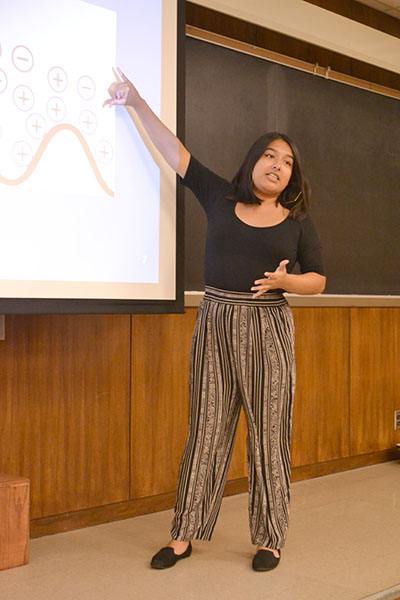
During the August 2nd final presentation, I-MRSEC REU participant Hannah Gilbonio discusses her research done in Rashid Bashir's lab.
August 20, 2019
For ten weeks this past summer, eleven undergraduate students from all over the US showed up at Illinois to participate in I-MRSEC’s second Research Experience for Undergraduates (REU) program. As part of the experience, they not only conducted a research project, but they completed a paper and gave a final presentation. Of the 11 students, five were from Illinois (mostly from the Chicago area); six were from out of state (Tennessee, Oregon, Texas, and California). And although none of them are currently Illinois students, after experiencing what cutting-edge research at Illinois is like, some will most likely be applying to grad school here.
The main emphasis for the summer was the research experience. Students were assigned to labs of I-MRSEC faculty based on their interests. On the REU application, students were asked to write a personal statement about their research interests; plus they were provided a list of I-MRSEC faculty who were available as mentors, whom they were to rank in order of preference.
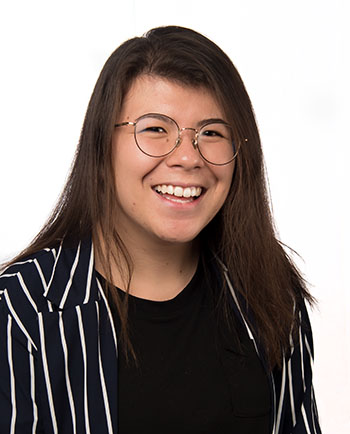
Jennifer Conner, who conducted research in Catherine Murphy's lab. (Image courtesy of Steph Adams.)
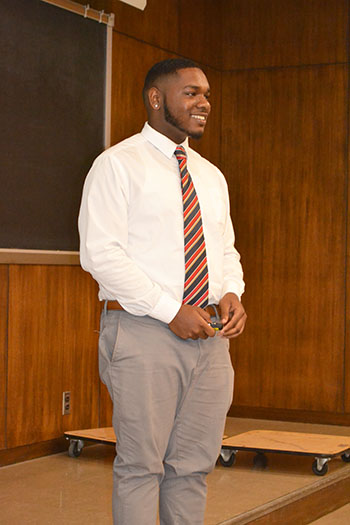
During the August 2nd final presentation, REU participant Michael Glasper answers questions about his research on the preparation and characterization of spin-polarized tips.
Once they arrived on campus, they spent two days at an orientation conference, the Advanced Materials Characterization Workshop held each year in June at the Materials Research Laboratory, then hit the labs, where they conducted research about a variety of topics, including antiferromagnetism, chemical vapor deposition, and spin-polarized tips, to name a few. Several projects researched various uses of graphene.
While participants spent the majority of the time in their lab working on their project with their mentors, the REU provided quite a number of group activities. For instance, their time on campus began with some joint orientation activities, such as the ice cream social so students could meet one another.
“The hope is that they come out of here with not just the lab experience, but other things that will contribute to them being well rounded scientists,” explains Pamela Pena Martin, the I-MRSEC Outreach Coordinator.
So the REU provided professional development activities, such as resume writing, how to do a job search, and how to apply to graduate school. Pena Martin, says: “We embed a lot of professional development and training into our program that would be very beneficial to them whether they want to go into academia or industry." She says their goal is "just to equip them to be successful in STEM careers in some way."
In addition to research and professional development, participants attended a 2-day conference and also visited the Argonne national lab.
Plus, there were activities to help them polish their communication skills, including scientific writing. For example, each student wrote a research paper. Plus, students used PowerPoint to prepare oral presentations, which they presented on August 2nd, the last day of their time at Illinois.
“We want them to know how scientists communicate; some of the main ways they do that are through writing, presentations, and conferences. So we thought that would be a valuable experience for them to have—writing. If scientists don't write up what they do in journals, it's really hard to communicate what you've done and allow it to impact science.”
According to Pena Martin, the undergraduate participants received quite a few benefits from their REU. The greatest benefit, of course, was the research experience.
“It's an extremely valuable program,” she explains. “REUs allow undergraduates, especially many of them who have never had a research experience because they're from a school that doesn't have a lot of opportunities for that, but allows them to really see how research is done.”
She says the experience offers the students a kind of fork in the road where they can go in an entirely new direction careerwise.
“It gives them sort of a clean slate in some ways,” she says. “You know, it's a new school that they've never been to. They probably don't know anybody or very few people here. They get to really sort of reinvent themselves and see if research is something that interests them.”
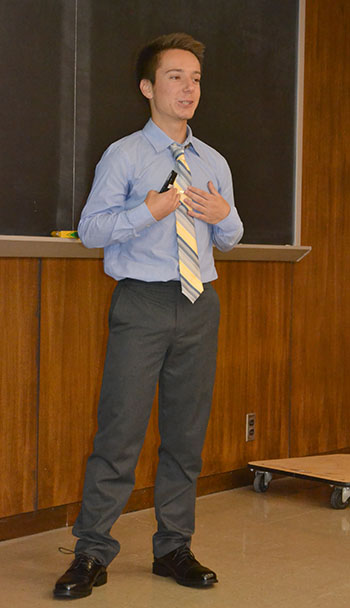
Lucas Komara presents his research during the final session of the I-MRSEC REU on August 2nd.
Plus, she says it’s also really valuable to them just for the experience. “They pick up a lot of skills throughout the summer…Even if they go on to do a project later that is not completely related, there may be skills they pick up that they can use in the other projects. So yeah, I think that's very valuable to them.”
In addition, the REU not only gives the students a positive research experience, but helps them get acquainted with Illinois as a possibility for grad school. It allows them get to know the faculty and students here, helping them to “really get embedded into campus and see what it might be like to spend more time here,” she says.
One undergrad, Lucas Komara, indicates that one of the benefits of the REU for him was personal growth in the area of managing his time: "It's time management," he admits. "It's definitely time management because I've been used to the community college lifestyle where I live at home; I've got my meals cooked for me; I can do my homework in my nice room. Now I have to cook for myself, clean for myself, on top of getting all my projects, making sure I reach everything by the deadline. And just making sure I'm on top of everything and not falling behind."
Komara also reports that this summer has also impacted his future career goals: "I really like the idea of nanotechnology, and since I'm going into electrical engineering, that's the basis of what I'm working on. And maybe I come to the point where I start integrating both things of doing whatever these micro circuits and assembling these for my job. And I'm actually really interested in that."
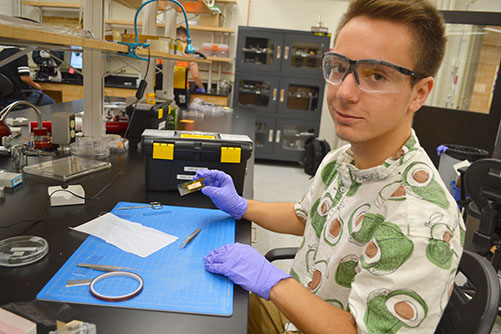
I-MRSEC REU participant Lucas Komara at work in Arend van der Zande's lab.
Angela Johnson, a junior at Chicago State University, shares why she participated in the I-MRSEC REU. “I wanted to step out my comfort zone and get the experience.” Part of that was interacting with members of the university culture. “I feel like this is a good opportunity to get to know different, diverse culture members. I think that's pretty cool.”
She also participated because she enjoys doing research: “Also, I really like doing lab; I love being in a lab doing research.” In fact, the I-MRSEC REU wasn’t Johnson’s first experience doing research. She studied abroad at Jeddah, Saudi Arabia, for a month last summer and reports, “It was really fun!”
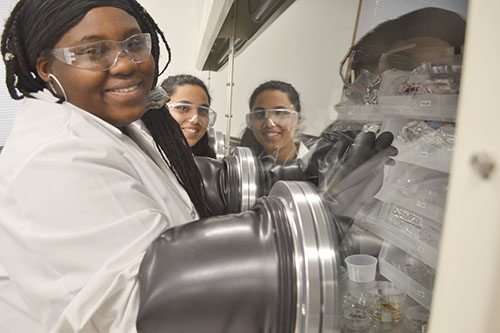
I-MRSEC REU participant Angela Johnson and her PhD mentor, Prapti Kafle, at work in Ying Diao's lab.
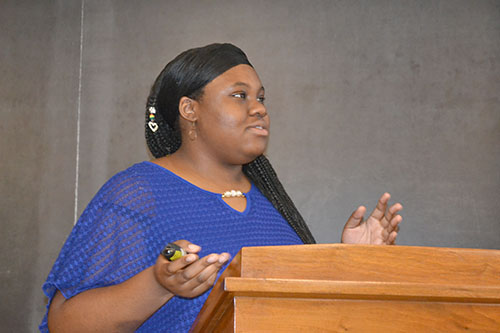
Angela Johnson presents her research at the final presentation on August 2nd.
Johnson’s research involved characterization and morphing of pharmaceutical nanothin films. While she says her dream career would be looking for cures for certain illnesses and diseases, she intends to go on to grad school, and believes the area she’s been researching might relate. “Yeah, I might study this one. I'm not a hundred percent sure yet, but this will be something I'm interested in too.”
Regarding one thing that Johnson found challenging about the summer, she admits, “Actually, there's like a bunch,” then narrowed it down to reading articles. Johnson says the most rewarding thing about the summer was the opportunities to hang out with everyone. “So, this week we're going hiking; so I'm looking forward to that. Last time went bowling. Got a lot of stuff to do here. So I'm having fun with other REUs.”
Based on the great time she had during her summer research experience, Johnson has a piece of advice which she hopes might motivate other young people to take advantage of opportunities like the I-MRSEC REU: “Whatever career you're interested in, you can do it. It may be hard down the road, but if you feel like there's something that you want to do, just do it—like this.”
The undergrads aren’t the only ones to benefit from the REU. The I-MRSEC program, including the faculty and grad students, benefit as well. For one it helps them achieve their mandate to train the next generation of materials scientists.
“Part of our goal is training in materials science at all levels. That's one of the foundations for the MRSEC,”Pena Martin reports. She claims the REU fits under that goal in that it helps them train up undergraduates to equip them for STEM careers.
Another one of the key benefits for I-MRSEC is recruiting bright, young students to grad school: “And then the hope is that many of them would be interested in graduate programs,” she adds, “and maybe here at Illinois.”
In addition, the REU is very valuable to I-MRSEC itself in other ways as well, such as providing innovative new ideas.
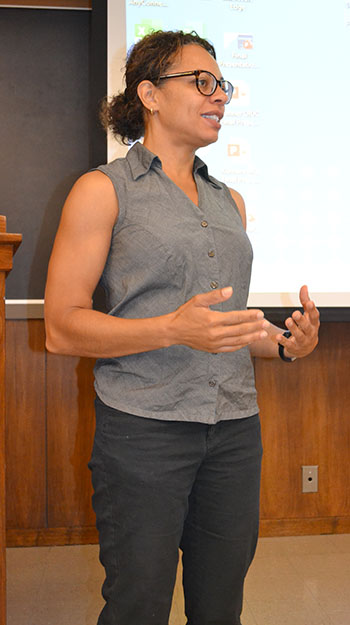
During the final presentation session, I-MRSEC PI Nadya Mason indicates that she had wanted to implement an I-MRSEC REU because of the impact an REU had had on her own career path.
“Having bright young researchers in the lab is really beneficial to our science as well, because each one of them has some background. They're early career, early stage researchers, but they do have experience, and they have creativity that is like nobody else. They have insights and backgrounds that are beneficial that bring new ideas into the Center. As they're working on these projects, they ask questions, they have ideas, and many times, these ideas instigate new directions that maybe their mentor wouldn't have even thought of. And so it's really beneficial."
Their grad student mentors gain valuable experience as well. First, they take mentoring training offered at the graduate college. It’s designed to help them to think more specifically about how to be an effective mentor, how to be efficient in what they're doing, as well as how to manage a student in the lab. That's a very valuable experience because many of the grad students will go on to have their own labs at universities or even in industry.
“You'll always be mentoring someone in some fashion,” she says. “So having that experience is really valuable to them as well. So it's valuable to everyone all around.”
One thing Pena Martin found helpful in terms of scheduling special activities is that they were able to collaborate with several other REU programs on campus by planning activities jointly such as some of the professional development and social activities. For instance, somewhere between 80 to 100 undergraduate researchers gathered at the ice cream social at the beginning of the summer where they had ice cream and did some icebreaker activities. The goal was to help students get to know each other.
“They're all pretty much new to campus and so they're starting to get to know the others in their program, but then this'll be a way for them to get to know others. Maybe they're looking for somebody who also likes music or running or something like that, to help them find people to spend time with this summer to make it a more positive experience.”
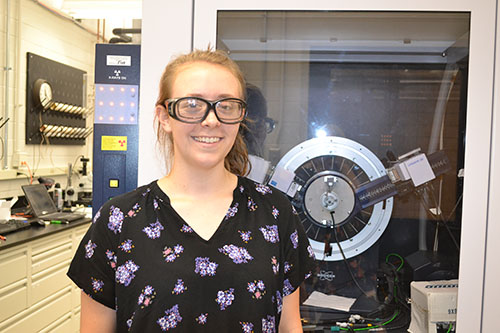
I-MRSEC undergrad Carmen Paquette by one of the instruments she used during her research in the synthesis of antiferromagnetic material this past summer in Professor Daniel Shoemaker's lab.
But also, networking is invaluable for scientists as well. For instance, these students may end up making relationships with other students with whom they’ll be in graduate programs together. They may even be colleagues one day.
Pena Martin values I-MRSEC’s REU program so much because she herself did an REU which significantly impacted her career choices. She shares her story.
She was a physics undergrad at Youngstown State, which didn’t have a graduate program in physics. “So I really didn't have exposure to what grad school would be like,” she recalls. So she did a Physics REU at Penn State.
“It was extremely formative,” she admits, “not only for giving me a research experience at a top research school. It exposed me to what graduate school even is. I'm not sure graduate school would have been on my radar without that experience.” She was also introduced to the field of material science since they have a MRSEC there at Penn State.
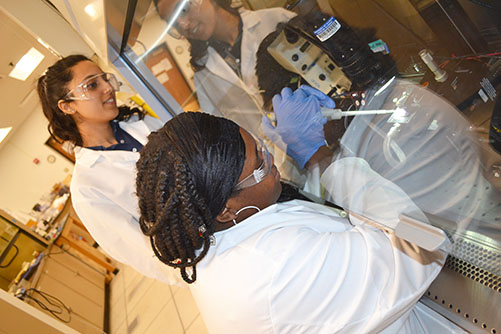
I-MRSEC undergrad Angela Johnson conducts her research in the Diao Lab while her grad student mentor, Prapti Kafle, looks on.
So although her REU was in physics, she learned what material science is through that REU and ended up pursuing a PhD in it here at Illinois.
“So that REU experience was extremely valuable to me. And that's why I think it gives me an extra passion to really want this program to be just as valuable. I really take great care in making sure that this program is effective, and that these students have a positive experience here, because I know the value my summer research experience was to me, and I want them to have that experience too.”
Story and photos by Elizabeth Innes, Communications Specialist, I-STEM Education Initiative.
For additional articles about the I-MRSEC REU, please see:
More: Externally Funded, I-MRSEC, MatSE, Physics, REU, Science Center, 2019
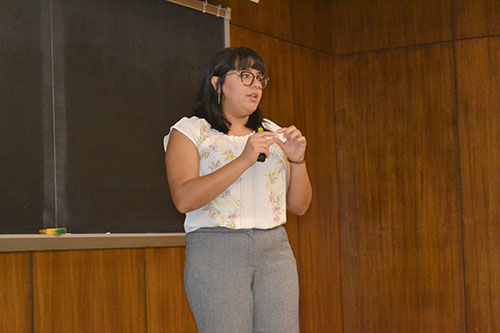 I-MRSEC undergrad Brenda Escobedo explains her research, "Fabrication of Deformed Graphene Heterostructures and characterization of Strain Using Raman Spectroscopy," done in Nadya Mason's lab this past summer.
I-MRSEC undergrad Brenda Escobedo explains her research, "Fabrication of Deformed Graphene Heterostructures and characterization of Strain Using Raman Spectroscopy," done in Nadya Mason's lab this past summer.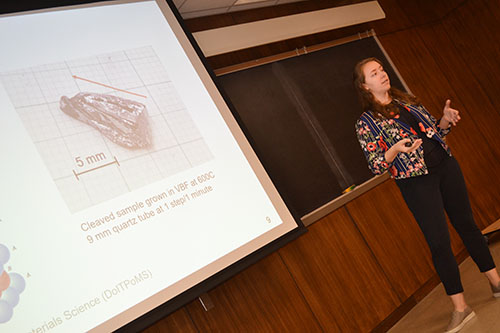
Carmen Paquette discusses her research regarding the synthesis of anti ferromagnetic material this past summer.
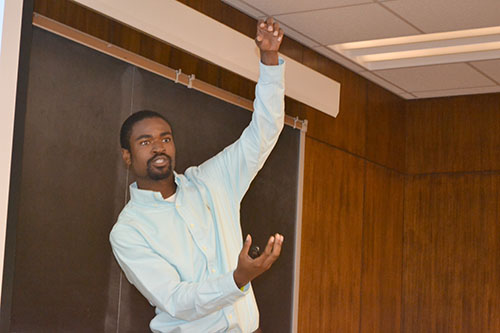
Andre Hillsman discusses his research on CVD Growth of MgxTi 1-xBx Films done in Professor John Abelson's lab.
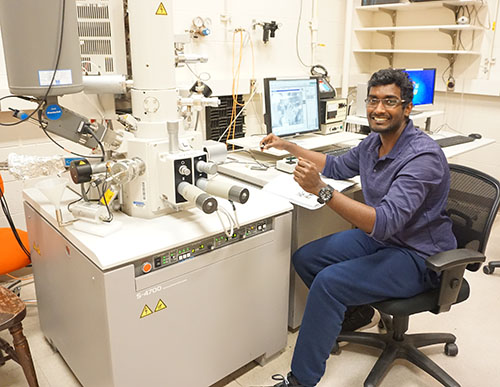 I-MRSEC undergrad Davis Zackaria using the SEM (scanning electron microscope) in the MRL. (Image courtesy of Pamela Pena Martin.)
I-MRSEC undergrad Davis Zackaria using the SEM (scanning electron microscope) in the MRL. (Image courtesy of Pamela Pena Martin.)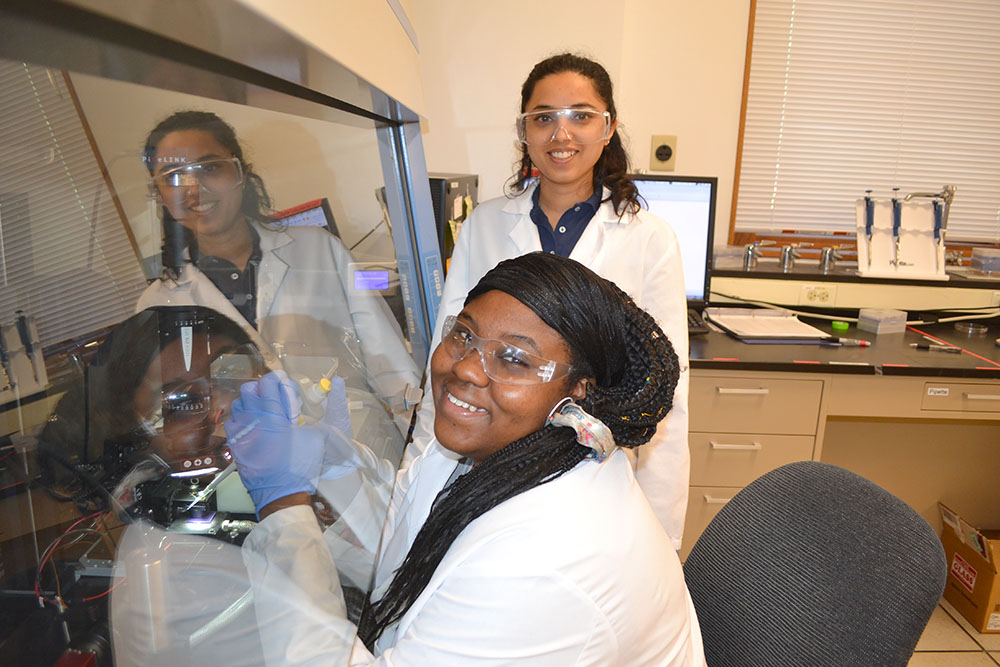
I-MRSEC undergrad Angela Johnson (bottom) conducts her research in the Diao Lab, mentored by PhD student, Prapti Kafle.
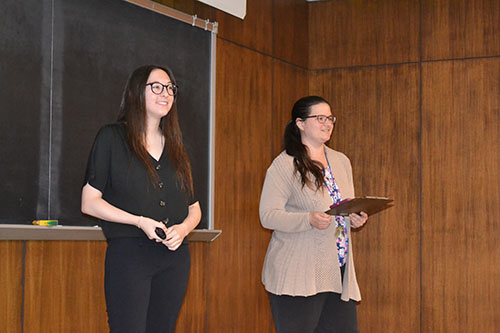
I-MRSEC REU participant Lauren Gorman (left) waits to answer questions as I-MRSEC Outreach Coordinator Pamela Pena Martin moderates a Q&A after Gorman's presentation.













.jpg)
















